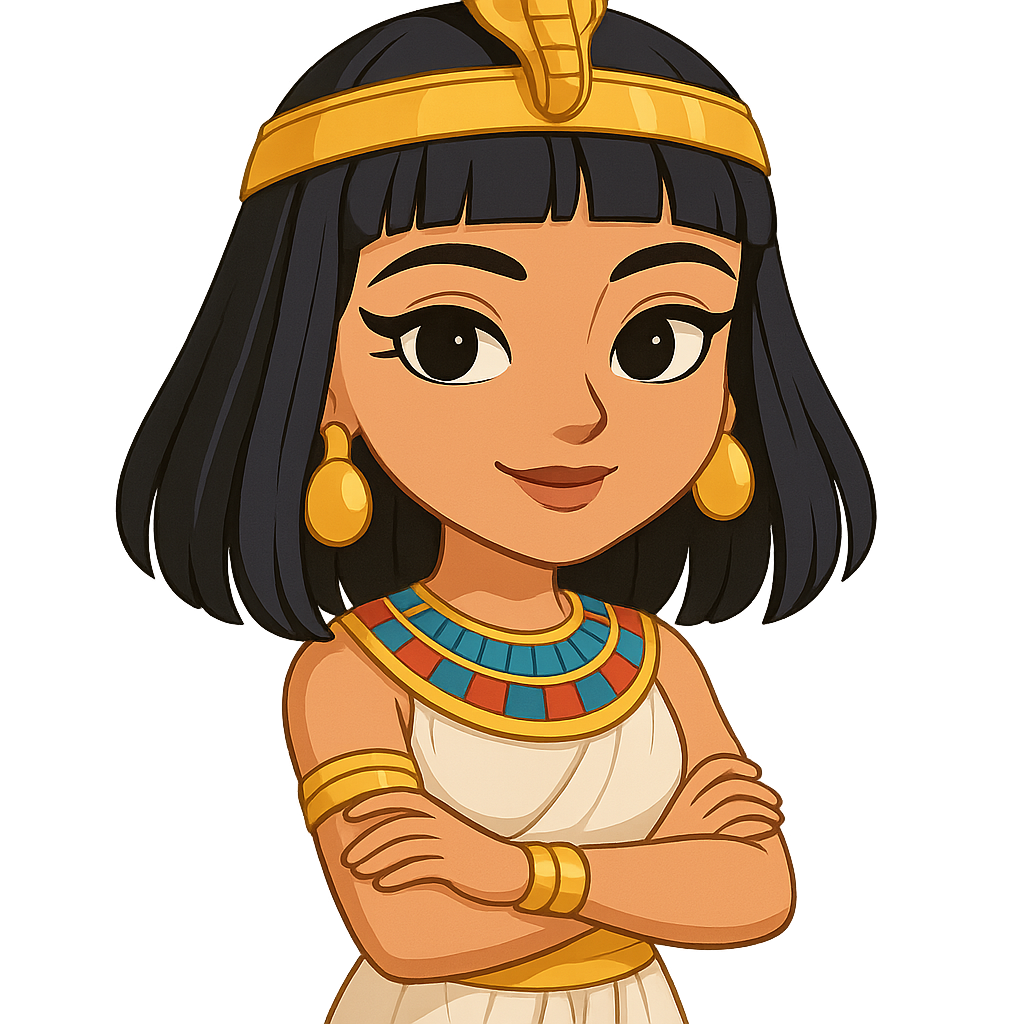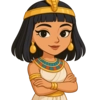Cleopatra: The Last Pharaoh of Egypt
Hello. You may know my name, Cleopatra, and think of me as the last queen of Egypt. But before I was a queen, I was a girl who lived in a palace of learning. I was born in the year 69 BCE in Alexandria, the most magnificent city in the world. Imagine streets paved with marble, a great lighthouse that guided ships from across the sea, and a library that held the knowledge of centuries. This was my home. My family, the Ptolemies, were Greek, but we ruled over the ancient land of Egypt. While my siblings played games, I spent my days in the Great Library and the Museum, which was a center for scholars and scientists. I was not just a princess; I was a student. I studied astronomy with scholars who mapped the stars, I debated philosophy, and I read the histories of great kings and queens. I learned to speak nine languages, so I could speak to diplomats and merchants from faraway lands in their own tongue. But the language I was most proud to learn was Egyptian. For 300 years, my family had ruled Egypt without ever speaking the language of its people. I thought this was a mistake. How could I rule a kingdom if I could not speak to my own subjects? Learning their language was my way of showing them that I was not just a Greek queen, but their pharaoh. My childhood was not all books and study, however. The palace was filled with dangerous whispers and political plots. My own family members schemed against one another for power. I learned early that to survive, I had to be clever, watchful, and brave. When my father died in 51 BCE, I became queen at only eighteen years old. I was meant to rule alongside my younger brother, Ptolemy XIII, who was only ten. I knew then that my days of quiet study were over. I would have to use all my knowledge and courage to protect my throne and my beloved Egypt.
My reign began with betrayal. The powerful advisors who surrounded my young brother did not want a strong, intelligent woman on the throne. They saw me as a threat. In 48 BCE, they turned my brother against me and used his army to drive me out of my own city, Alexandria. I was forced to flee into the desert, an exiled queen. But I refused to be defeated. It was during this time that the most powerful man in the world, the Roman general Julius Caesar, arrived in Egypt. I knew that if I could win his support, I could reclaim my throne. The problem was, my brother's army controlled the harbor. There was no way for me to reach Caesar. So, I devised a bold plan. I had my most loyal servants wrap me tightly in a roll of bedding—some stories say it was a beautiful carpet—and carry me past the enemy guards as a gift for the Roman general. Imagine his surprise when they unrolled the carpet and I, the Queen of Egypt, tumbled out at his feet. Caesar was impressed by my courage and my intelligence. We talked for hours about history, politics, and the future. He saw that I was not just a desperate girl, but a capable ruler who could be a valuable ally to Rome. He agreed to help me. With the power of his Roman legions, we defeated my brother's forces, and I was restored to my throne. Our alliance became more than political. We fell in love, and in 47 BCE, I gave birth to our son, whom I named Ptolemy Caesar, but the people of Alexandria called him Caesarion, or 'little Caesar.'. I traveled to Rome with him and was celebrated by Caesar, but some Romans feared my influence. Their fear turned to violence, and on the Ides of March in 44 BCE, Julius Caesar was assassinated in the Roman Senate. My protector was gone, and Rome was thrown into chaos. I returned to Egypt immediately to protect my son and my kingdom. A new power struggle began in Rome, between Caesar's adopted son, Octavian, and his most trusted general, Mark Antony. I knew I had to choose a side. In 41 BCE, I received a summons from Mark Antony to meet him in Tarsus. This time, I would not arrive in a carpet. I sailed up the river on a magnificent golden barge with purple sails, dressed as the goddess Venus. I wanted to show him the wealth and power of Egypt, and the strength of its queen. The plan worked. Antony was captivated, and a new alliance—and a new love—was forged. Together, we believed we could build a future greater than even Caesar had imagined.
My years with Mark Antony were a time of great hope and great love. We were partners in every sense of the word. We shared a vision of a grand empire in the East, with my dazzling Alexandria as its capital, rivaling the power of Rome itself. This dream, however, made a powerful enemy of Octavian back in Rome. He used our relationship against us, telling the Roman people that I had bewitched Antony and that Antony planned to give away parts of the Roman Republic to a foreign queen. He declared war, not on Antony, but on me. The final confrontation came in 31 BCE, at a massive naval battle near a place called Actium. It was a disaster. Our fleet was outmaneuvered and destroyed. We managed to escape and return to Egypt, but we knew our dream was over. Octavian’s armies followed us. As they closed in on Alexandria in 30 BCE, Antony took his own life, believing I was already dead. I was captured, but I had one final move to make. Octavian planned to take me back to Rome and parade me through the streets in chains as the centerpiece of his victory celebration, his Roman triumph. I would be a symbol of his power and Egypt's defeat. I could not bear such a humiliation, not for myself, and not for the honor of my country. I was a queen, the daughter of a long line of kings, and I would not be displayed as a prize. I chose my own end, with dignity. My story does not truly end there. Though my life came to an end in 30 BCE and Egypt became a province of Rome, I hope you remember me not for my defeat, but for how I lived. I was the last pharaoh, a ruler who spoke the language of her people, who outsmarted the most powerful men in the world, and who fought with all her heart and mind for the love of Egypt.
Reading Comprehension Questions
Click to see answer



